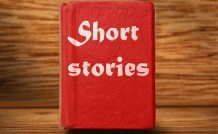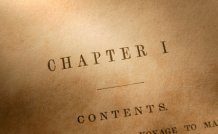Online Class: Creative Writing for Beginners

no certificate
with CEU Certificate*
-
15Lessons
-
32Exams &
Assignments -
5,246Students
have taken this course -
14Hours
average time -
1.4CEUs
Course Description
Creative writing is a form of artistic expression. While the painter uses canvas and the sculptor uses clay, the writer uses pen and paper – or computer and keyboard in today's world. This course is designed to teach you the tools and mechanics of creative writing. You'll learn about writing fiction, poetry, screenplays, and even nonfiction. It doesn't matter if you're already writing or if you want to learn more about it so you can start. This course teaches you the basics that you need to know and gives you the skill sets you need to start creating your written works of art.
You'll learn:
- The different forms of creative writing
- The true value of creative writing
- Reasons why you should write
- The tools you need to write excellent fiction
- The different types of nonfiction
- How to write memoirs, biographies, and autobiographies
- How to write articles for newspapers, blogs, or journals
- How to overcome writer's block
- How to write poetry
- And how to get your work recognized and published
There are fifteen comprehensive lessons in this course. After each lesson, you'll find exercises that will help you review what you've learned. You'll also find a dozen writing assignments that you can use to get the ideas flowing and start writing.
This course is the perfect introduction to creative writing. It will teach even the newest writers how to successfully take their ideas and put them onto paper. Even if you've never written anything before, this course will get you started – and you'll be amazed at how well you can actually do once you've finished.
Course Motivation
There are 15 lessons in this course. Each lesson is broken down in order to address a form of creative writing, and to explore the tools and mechanics that pertain to it. After each lesson, you will find exercises. These are simply a way to gauge what you have learned and help you reinforce what was covered in the lesson. The exercises are mandatory, and they are what you will be graded on for this course.
About Creative Writing
Creative Writing Defined
The Different Types of Creative Writing
- Fiction . Of course, fiction is the most recognized form of creative writing since the stories begin in your imagination.
- Journals and diaries . Most people don't think of this as creative writing, but keeping a journal or diary (for personal or family history reasons) is just as much creative writing as any other form.
- Blogs . Let's face it. Blogs have changed the way we read the news and also given us insight into the things that interest us and the lives of those people who interest us.
- Articles . Articles may contain facts, but creativity is put into constructing and writing them in a way that will interest the reader.
- Screenplays . What's the funniest movie you ever watched? Did you ever think about the writer who created the screenplay?
- Nonfiction . It's the same as it is with articles. The facts inside a nonfiction book or story may be true, but a lot of creativity goes into making it fun and interesting to read. It's a safe bet that you've never read a nonfiction book that put you to sleep.
- Memoirs . Whether you're writing your own or someone else's, this is another form of creative writing.
- Poetry . Poems are probably one of the most artistic forms of creative writing, because of the imagery they evoke when written well.
The Value of Creative Writing
It's a great thing if your goal is to become a published writer, or even a well-read blogger or journalist. But that should not be your only reason for writing. The writing world is highly competitive, and it's extremely critical. Even the best-known, most popular authors papered their walls with rejection slips, or lived as an unknown for years before they rose to popularity. That said, anyone who starts creative writing simply because they think their writing is so different or special that everyone will instantly fall in love with their words is headed for heartbreak. It's a long road to that point, and it's filled with potholes.
The real value of creative writing lies in the enjoyment you get from it, as well as the enjoyment the people closest to you will get from it. You can publish you own blog and only have 20 people who read it faithfully.Guess what? That makes you successful if you enjoy writing it, and those that read it (no matter how many or how few) enjoy it as well.
Creative writing is our escape from our worlds. It's also a way to document the things that go on around us. Even a short story you write, then cram into a drawer, will have value to those who read it years from now. It will tell them a story about you, the things that were on your mind, and the world around you at that time. Think of the classic books from writers such as Ernest Hemingway and F. Scott Fitzgerald. Think of nonfiction biographies like that of Ann Frank. Even if your work is never widely read or published, it will have value to those who read it now – and even more value later as a historical account.
But more than anything, as we said before, the true value of creative writing is the enjoyment that you get from it.
- Completely Online
- Self-Paced
- 6 Months to Complete
- 24/7 Availability
- Start Anytime
- PC & Mac Compatible
- Android & iOS Friendly
- Accredited CEUs

Course Lessons
Lesson 1: Introduction to Creative Writing
 Lesson 1 Video
Lesson 1 Video Lesson discussions: Writing; Reasons for Taking this Course
Lesson discussions: Writing; Reasons for Taking this Course Complete Assignment: An Introduction
Complete Assignment: An Introduction Complete: Lesson 1 Assignment
Complete: Lesson 1 Assignment Assessment: Lesson 1 Exam
Assessment: Lesson 1 Exam
Lesson 2: Exploring Creative Writing
 Lesson 2 Video
Lesson 2 Video Complete: Lesson 2 Assignment
Complete: Lesson 2 Assignment Assessment: Lesson 2 Exam
Assessment: Lesson 2 Exam
Lesson 3: Secrets of Creative Writing
 Lesson 3 Video
Lesson 3 Video Complete: Lesson 3 Assignment
Complete: Lesson 3 Assignment Assessment: Lesson 3 Exam
Assessment: Lesson 3 Exam
Lesson 4: Elements of Short Story and Fiction Writing
 Lesson 4 Video
Lesson 4 Video Complete: Lesson 4 Assignment
Complete: Lesson 4 Assignment Assessment: Lesson 4 Exam
Assessment: Lesson 4 Exam
Lesson 5: Dialogue
 Lesson 5 Video
Lesson 5 Video Complete: Lesson 5 Assignment
Complete: Lesson 5 Assignment Assessment: Lesson 5 Exam
Assessment: Lesson 5 Exam
Lesson 6: Point of View
 Lesson 6 Video
Lesson 6 Video Lesson discussions: Point of View
Lesson discussions: Point of View Complete: Lesson 6 Assignment
Complete: Lesson 6 Assignment Assessment: Lesson 6 Exam
Assessment: Lesson 6 Exam
Lesson 7: Writing Nonfiction
 Complete: Lesson 7 Assignment
Complete: Lesson 7 Assignment Assessment: Lesson 7 Exam
Assessment: Lesson 7 Exam
Lesson 8: Writing Poetry
 Lesson 8 Video
Lesson 8 Video Complete: Lesson 8 Assignment
Complete: Lesson 8 Assignment Assessment: Lesson 8 Exam
Assessment: Lesson 8 Exam
Lesson 9: Writing Articles, Blogs, and Journalistic Pieces
 Lesson 9 Video
Lesson 9 Video Complete: Lesson 9 Assignment
Complete: Lesson 9 Assignment Assessment: Lesson 9 Exam
Assessment: Lesson 9 Exam
Lesson 10: Writing Dramas, Scripts, and Screenplays
 Lesson 10 Video
Lesson 10 Video Complete: Lesson 10 Assignment
Complete: Lesson 10 Assignment Assessment: Lesson 10 Exam
Assessment: Lesson 10 Exam
Lesson 11: The Importance of Editing
 Lesson 11 Video
Lesson 11 Video Complete: Lesson 11 Assignment
Complete: Lesson 11 Assignment Assessment: Lesson 11 Exam
Assessment: Lesson 11 Exam
Lesson 12: Overcoming Writer's Block
 Lesson 12 Video
Lesson 12 Video Lesson discussions: Writer's Block
Lesson discussions: Writer's Block Complete: Lesson 12 Assignment
Complete: Lesson 12 Assignment Assessment: Lesson 12 Exam
Assessment: Lesson 12 Exam
Lesson 13: Unlocking Your Creativity
 Lesson 13 Video
Lesson 13 Video Complete: Lesson 13 Assignment
Complete: Lesson 13 Assignment Assessment: Lesson 13 Exam
Assessment: Lesson 13 Exam
Lesson 14: Resources for Writers
 Lesson 14 Video
Lesson 14 Video Complete: Lesson 14 Assignment
Complete: Lesson 14 Assignment Assessment: Lesson 14 Exam
Assessment: Lesson 14 Exam
Lesson 15: Publishing Your Writing
 Lesson 15 Video
Lesson 15 Video Lesson discussions: What do you think about this course?; Program Evaluation Follow-up Survey (End of Course); Course Comments
Lesson discussions: What do you think about this course?; Program Evaluation Follow-up Survey (End of Course); Course Comments Complete: Lesson 15 Assignment
Complete: Lesson 15 Assignment Assessment: Lesson 15 Exam
Assessment: Lesson 15 Exam Assessment: The Final Exam
Assessment: The Final Exam
Learning Outcomes
- Describe the creative writing process.
- Define elements of short story and fiction writing.
- Demonstrate dialogue.
- Demonstrate point of view.
- Demonstrate writing nonfiction.
- Demonstrate writing poetry.
- Demonstrate writing articles, blogs, and journalistic pieces.
- Demonstrate writing dramas, scripts, and screenplays.
- Describe the importance of editing.
- Describe techniques overcoming writer's block.
- Recognize new ways to unlock your creativity.
- Describe ways to publish your writing.
- Demonstrate mastery of lesson content at levels of 70% or higher.
Additional Course Information

- Document Your Lifelong Learning Achievements
- Earn an Official Certificate Documenting Course Hours and CEUs
- Verify Your Certificate with a Unique Serial Number Online
- View and Share Your Certificate Online or Download/Print as PDF
- Display Your Certificate on Your Resume and Promote Your Achievements Using Social Media

Choose Your Subscription Plan
No Certificate / No CEUs
This course only
| Includes certificate | X |
| Includes CEUs | X |
| Self-paced |

|
| Instructor support |

|
| Time to complete | 6 months |
| No. of courses | 1 course |
Certificate & CEUs
This course only
| Includes certificate |

|
| Includes CEUs |

|
| Self-paced |

|
| Instructor support |

|
| Time to complete | 6 months |
| No. of courses | 1 course |
Certificates & CEUs
Includes all 600+ courses
| Includes certificate |

|
| Includes CEUs |

|
| Self-paced |

|
| Instructor support |

|
| Time to complete | 12 Months |
| No. of courses | 600+ |
Certificates & CEUs
Includes all 600+ courses
| Includes certificate |

|
| Includes CEUs |

|
| Self-paced |

|
| Instructor support |

|
| Time to complete | 24 Months |
| No. of courses | 600+ |
Student Testimonials
- "I have a B.A. in Creative Writing and let me tell you, this course was both incredibly helpful and very fun. I have honestly learned more from this course than most of my college classes. The assignments were engaging and immensely helpful. I went in thinking this course would be a refresher for me, but I am genuinely blown away by just how much I have learned." -- Kaitlyn W.
- "This course was helpful for me. I learned a considerable amount about writing in general as well as gaining insight into the creative aspect. I thoroughly enjoyed every assignment, in particular, that they were assessed, marked, and issued with comments. The turnaround time for the assessments provided was exceptional. I was encouraged by the regularly updated grading and having a report card for reference. The course content provided me with what I was wanting and more. Recommending your course will be a pleasure for me and I will take on another in the, not too distant future. Many Thanks." -- Peter P.
- "I found this course very helpful. I learnt a lot about the different types of writing and which forms/genres I hope to pursue. The writing prompt exercises were especially helpful, as they are a good practice to keep yourself writing when you can't think of any original ideas yourself." -- Lisa K.
- "I really enjoyed this course! I have loved writing my whole life, but I still learned a lot about different writing techniques and styles. I loved receiving the positive feedback from my tutor too. I found some of the writing assignments appropriately challenging and they forced me to put into action what I was being taught...Thank you for all of the work that went into creating this course!" -- Michaela D.
- "It really helped with positive feedback from the instructor and her quick response to my assignments." -- Deborah D.
- "Thank you so much, I feel like I've gained a lot from this course. I definitely consider it a great starting point for me to build upon and hone my craft further. Thank you, and you'll most likely see me in another writing course soon." -- Michele C.
- "I really enjoyed doing this course and the help and advice from the instructor." -- Tammy P.
- "The instructor was very fair and very timely in getting my assignments/exams back." -- Mary lee S.
- "The instructor is a blessing and was so encouraging." -- Daphne B.
- "The instructor was extremely prompt in grading assignments and provided valuable feedback." -- Randy E.
Related Courses
-
 87 hours
8.7 CEUs
Writing Help Course Bundle
$135.00
87 hours
8.7 CEUs
Writing Help Course Bundle
$135.00
-
 12 hours
1.2 CEUs
Paranormal Romance Writing
$95.00
12 hours
1.2 CEUs
Paranormal Romance Writing
$95.00
-
 12 hours
1.2 CEUs
How to Write Case Studies
$95.00
12 hours
1.2 CEUs
How to Write Case Studies
$95.00
-
 14 hours
1.4 CEUs
Journalism 101
$95.00
14 hours
1.4 CEUs
Journalism 101
$95.00
-
 17 hours
1.7 CEUs
Poetry Writing 101
$95.00
17 hours
1.7 CEUs
Poetry Writing 101
$95.00
-
 5 hours
0.5 CEUs
Writing the Great American Short Story
$95.00
5 hours
0.5 CEUs
Writing the Great American Short Story
$95.00
-
 16 hours
1.6 CEUs
Advertising Copywriter
$95.00
16 hours
1.6 CEUs
Advertising Copywriter
$95.00
-
 11 hours
1.1 CEUs
Humor Writing 101
$95.00
11 hours
1.1 CEUs
Humor Writing 101
$95.00
-
 14 hours
1.4 CEUs
Writing Improvement 101
$95.00
14 hours
1.4 CEUs
Writing Improvement 101
$95.00
-
 9 hours
0.9 CEUs
Mystery Writing
$95.00
9 hours
0.9 CEUs
Mystery Writing
$95.00
-
 6 hours
0.6 CEUs
Freelance Writing 101
$95.00
6 hours
0.6 CEUs
Freelance Writing 101
$95.00
-
 7 hours
0.7 CEUs
Writing Women's Fiction
$95.00
7 hours
0.7 CEUs
Writing Women's Fiction
$95.00
-
 14 hours
1.4 CEUs
Creative Writing for Beginners
$95.00
14 hours
1.4 CEUs
Creative Writing for Beginners
$95.00
-
 12 hours
1.2 CEUs
Romance Writing
$95.00
12 hours
1.2 CEUs
Romance Writing
$95.00
-
 11 hours
1.1 CEUs
Journaling and Memoir Writing
$95.00
11 hours
1.1 CEUs
Journaling and Memoir Writing
$95.00
-
 10 hours
1.0 CEUs
Travel Writing 101
$95.00
10 hours
1.0 CEUs
Travel Writing 101
$95.00
-
 19 hours
1.9 CEUs
Creative Writing 101
$95.00
19 hours
1.9 CEUs
Creative Writing 101
$95.00
-
 12 hours
1.2 CEUs
Writing Effective Persuasion
$95.00
12 hours
1.2 CEUs
Writing Effective Persuasion
$95.00
-
 12 hours
1.2 CEUs
Screenwriting 101
$95.00
12 hours
1.2 CEUs
Screenwriting 101
$95.00
-
 11 hours
1.1 CEUs
How to Write Short Stories for Children
$95.00
11 hours
1.1 CEUs
How to Write Short Stories for Children
$95.00
-
 11 hours
1.1 CEUs
Proofreading and Copyediting 101
$95.00
11 hours
1.1 CEUs
Proofreading and Copyediting 101
$95.00
-
 11 hours
1.1 CEUs
How to Write a Short Story
$95.00
11 hours
1.1 CEUs
How to Write a Short Story
$95.00
-
 11 hours
1.1 CEUs
Writing Effective Emails in the Workplace
$95.00
11 hours
1.1 CEUs
Writing Effective Emails in the Workplace
$95.00
-
 12 hours
1.2 CEUs
Advertising, Marketing and Sales Writing
$95.00
12 hours
1.2 CEUs
Advertising, Marketing and Sales Writing
$95.00
-
 23 hours
2.3 CEUs
Historical Fiction Writing
$95.00
23 hours
2.3 CEUs
Historical Fiction Writing
$95.00
-
 9 hours
0.9 CEUs
Nonfiction Writing 101
$95.00
9 hours
0.9 CEUs
Nonfiction Writing 101
$95.00









